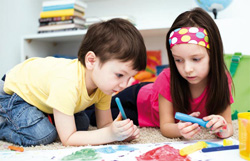 The other day I couldn’t remember how many ounces are in a cup so I went to the cupboard to get out my measuring cup when my four-year-old daughter interjected, “Well Mom, if you don’t know the answer, just ask Google!”
The other day I couldn’t remember how many ounces are in a cup so I went to the cupboard to get out my measuring cup when my four-year-old daughter interjected, “Well Mom, if you don’t know the answer, just ask Google!”
I was both horrified and impressed at that moment. Impressed because she knew that the information was available via the internet, but horrified to realise that she didn’t know there was an even simpler way to discover the truth… I could just look at my measuring cup.
Technology has found its way into almost every aspect of our modern lives. I sit here right now typing away on my ultra thin and lightweight laptop while inside my purse just a foot away, yet another screen is available at a moment’s notice, just in case I’d like to check the weather, reach out to a friend, or watch a movie.
For our children, this is the way things have always been. They aren’t surprised by the fact that my phone can give me step-by-step instructions on how to get to a new friend’s house. Instead, they wonder why we adults are all so freaked out about screen time.
I don’t know any child who would actually rather watch a screen than get out into nature
But the research is clear, excessive screen time is not good for developing brains. In fact, researchers can actually predict a child’s future IQ based on how much of the time he or she sits in front of the television daily. And the result is: the more television hours, the lower the IQ.
So how can we help our children unplug and support their developing brains? I’ve got tips, but you might not like them… here they are.
1. Reduce your own screen time
The first thing to notice is what we’re modelling for our kids. If we spend all day connected to screens, we can hardly expect them to act differently. Their survival depends on following our lead and learning skills from us that they will need to thrive. So if we want our children to limit their screen time, guess what? We have to show them how. Turn off, unplug, and put away your screens. You can start with meal times, or a couple of hours in the evening. You can even go camping or schedule a vacation somewhere without TV/internet access. You could even choose to go on a [gasp!] Facebook diet.
Making interesting fiction and non-fiction books available for children to explore is a great way to entice them away from a screen
2. Offer alternative activities that are more fun
I don’t know any child who would actually rather watch a screen than get out into nature. Taking a walk, hike or bike ride is good for our health, reduces our blood pressure, and helps us relax. Going to a park, beach or studying wildlife can also be a great alternative.
Sometimes spending time in nature can be a spiritually moving and life altering experience. So don’t think you have to have a plan for the whole day; just pack a bag with water and snacks, get outside and see what happens!
I remember a time during college where our class assignment was to observe one square foot of ground for 30 minutes. I thought it would be incredibly boring. And there were moments when it seemed like nothing was happening, but then I’d notice an ant collecting food and I would feel the breeze and the sun would go behind a cloud and everything would change.
3. Books
Sure we can get lots of information online, but there’s nothing quite like the feeling of holding a good book in your hands. Making interesting fiction and non-fiction books available for children to explore is a great way to entice them away from a screen.
We recently checked out a book on science experiments for kids and my daughter is very excited about the experiments we’ve begun. In one simple experiment, we had three bowls of water: one warm, one cold and one at room temperature. The experiment was to put one hand in the warm water and one hand in the cold water for 30 seconds. Afterward, she was instructed to put both hands in the room temperature water and notice how each hand felt. She was amazed at the results. The room temperature water felt cold to her warm hand and warm to her cold hand, even though the water was the same temperature!
Engaging in scientific exploration is a great way to develop critical thinking skills and advance the love of learning.
Wouldn’t it be nice to know that your child can sew on a button, play an instrument, or convert ounces to cups without asking Google?
4. Creative endeavours
Painting, singing, playing music, sculpture, dancing and theatre are all incredibly good for our brains and our bodies. Engaging in creativity uses parts of our brains that go unused when we’re passively watching a screen. And these creative pursuits can be incredibly rewarding too.
It’s quite satisfying to paint around on a canvas or finally master a challenging riff. You may want to get some direct instruction for your child, or you can just let her explore and see where her interests take her.
Engaging in your own creative interests is the best way to encourage your child to develop hers. And even if you don’t consider yourself artistically inclined, it’s good for you and for your child to explore new activities and interests. Maybe there’s something you’ve always wanted to try, or an extension of something you’ve already mastered. Allow your children to witness your own process of creative discovery and support them in theirs.
5. Food preparation
Including children in food preparation is a wonderful way to introduce them to crucial skills like cutting safely with a sharp knife or using a hot stove. Since you’re there to supervise, you can make sure all the dangers are apparent and you can model safe kitchen practices. Who knows, you may even discover that your child has a hidden talent for cooking or baking!
In addition, you can grow your own garden to help children understand the entire process of cultivating and preparing food. Did you know that micro-organisms found in soil have been shown to significantly increase happiness? These organisms actually affect the serotonin levels in your brain! Besides, there is something so very satisfying about watching a tiny seed grow to maturity and eventually eating the fruits of your labour.
Sure, most of my suggestions require that we adults actually put down our devices, go outside and engage in life in a new way. But isn’t that what we most want for our children? Wouldn’t it be nice to know that your child can sew on a button, play an instrument, or convert ounces to cups without asking Google?
It’s up to us to determine the culture of our own homes and families and if we choose less screen time and more time cooking together, I think we’ll be well on our way to the thoughtful, engaged citizens we dearly hope our children will become.




